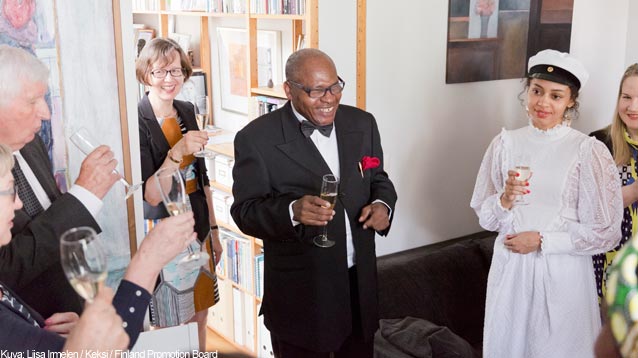Introduction of matriculation examination in English is progressing

A project examining the preconditions for introducing a possibility to take the matriculation examination in English in addition to Finnish and Swedish is progressing. The possibility would serve especially those who have completed their basic education and general upper secondary education in English or in two languages, Finns returning from abroad and having English as their strongest academic language, and young people who have moved to Finland due to their parents' work and who have had English as their school language.
A report examining the possibilities to arrange the matriculation examination in English and the costs for this, drawn up by Principal Harri Rinta-aho and Adjunct Professor Kati Mikkola, was submitted to Minister of Education Sanni Grahn-Laasonen on Friday 9 March. Minister Grahn-Laasonen appointed the rapporteurs to examine the matter in December 2017.
"English is the universal language of science and international relations. Finland is becoming ever more international and the amount of international interaction is increasing. Demand for general upper secondary education provided in English is also growing. The report provides a good foundation for taking the introduction of the matriculation examination in English forward as part of the larger reform of general upper secondary education," says Minister of Education Sanni Grahn-Laasonen.
"The possibility to take the matriculation examination also in English would support young people's opportunities for internationalisation and enhance Finland's attractiveness from the perspective of international talents. This would also promote the broader objective of increasing internationalisation in education," Minister of Education says.
According to the proposal, the structure of the matriculation examination in English would have to correspond to the examination in Finnish and Swedish as much as possible. The matriculation examination to be taken in English would also have to include an exam in at least one of Finland's national languages. The range of exams offered in English should be the same as in Finnish and Swedish.
The rapporteurs propose that the language of examination should primarily be tied to the language of instruction. To guarantee regional equality and students' best interests, taking the examination in English should, however, be made possible upon separate application also in general upper secondary schools that do not provide any studies in English.
In 2016, a working group for educational exports in upper secondary education, appointed by the Ministry of Education and Culture, proposed that the potential of the Finnish matriculation examination to be exported and the related needs for legislative amendments should be examined. One of the options presented was introduction of the possibility to take the examination in English. The introduction of this possibility would create new opportunities for the export of Finnish general upper secondary education.
The report examining the possibilities to introduce the matriculation examination in English was drawn up as part of the Government reform of general upper secondary education. Before this, trials experimenting with matriculation examination in English were carried out in the 1990s.
The Government has set as an objective to make Finnish education and research more international. During this government term, numerous measures aiming to enhance internationality in all education from early childhood education and care to higher education have been carried out. The joint Talent Boost programme of the Government aims to attract international talents to Finland and to make use of their expertise and networks to attract foreign investments to Finland.
In the beginning of February, Grahn-Laasonen invited representatives of the largest cities to discuss the possibilities to increase the supply of international education in Finland. Following these discussions, many cities have already decided to remarkably increase their supply of education in foreign languages. For example, Helsinki will double its supply of education in English at a brisk pace. At the moment, the City of Helsinki has five schools providing bilingual weighted-curriculum education (Finnish-English) starting in the 1st grade and five schools starting in the 7th grade.
Inquiries:
- Harri Rinta-aho, Principal, tel. +358 50 5532123
- Kati Mikkola, Adjunct Professor, tel. +358 40 5144 956
- Tiina Silander, Project Manager, tel. +358 295 3 30188
- Daniel Sazonov, Special Adviser (requests for interviews with the Minister), tel. +358 295 3 30276

